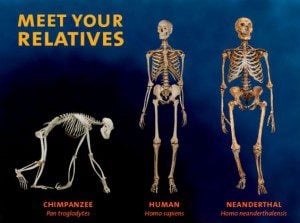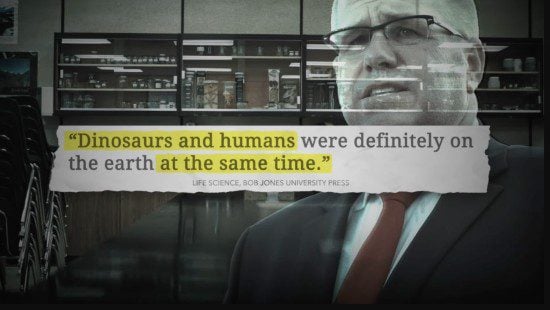In his first article on the recent Wheaton College meltdown, back in December, religion reporter Jonathan Merritt described the school this way:
Founded in 1860, Wheaton has long been considered a fairly open-minded institution within evangelicalism. Science professors can teach evolution, government professors need not support conservative political theories, and students don’t have to worry about strict dress codes or stringent curfews like students at more fundamentalist colleges.
Take a moment to absorb the strangeness of that phrase “science professors can teach evolution.” Science teachers can teach science. They can do so. It is permitted as one of the options allowed to them. That’s just … weird.
It’s like reading that chemistry professors have permission to mention the periodic table of the elements. Or that history professors are permitted to acknowledge the existence of Europe.
It’s always a bit disturbing when someone goes out of their way to say something that ought to go without saying. Walk into a restaurant with a sign reading “All fountain drinks 100% arsenic free!” and you’ll be more worried than you would be in a place without such a sign. It doesn’t so much reassure you that these drinks aren’t poisonous as suggest that you’re dealing with people for whom serving non-poisonous beverages is worthy of remark. And that’s unsettling. It’s the opposite of reassuring.
But that’s not the biggest problem with this phrase, “science professors can teach evolution.” The biggest problem with this phrase is that it’s not true.
Science professors at Wheaton College, in fact, cannot teach evolution. Not really. They’re allowed to do so, but only up to a point. Which is to say they’re allowed to teach evolution, but not to teach it truthfully. Teaching it truthfully would violate the school’s Statement of Faith, which was amended in the 1990s to include an emphatic rejection of evolutionary science. Here’s the bit in question:
WE BELIEVE that God directly created Adam and Eve, the historical parents of the entire human race; and that they were created in His own image, distinct from all other living creatures, and in a state of original righteousness.
The attempt at lofty theological-sounding language blurs the intended meaning of that somewhat. The core of it is this: You must believe in a historical Adam and Eve who came into being as a discrete act of special divine creation.*
Enshrining that in Wheaton’s Statement of Faith was one of the first changes that Duane Litfin instituted when he took office as the school’s president in 1993:
One of his first moves was to declare that Wheaton’s “Statement of Faith” allowed too much wiggle room on the question of Adam and Eve. Scientists were thus required to clarify whether they (1) “reject the idea that Adam and Eve were created from pre-existing humanlike creatures, or hominids”; (2) are neutral or “unsure” on the hominid theory; (3) affirm that “God gave a human spirit to a pair of pre-existing human-like creatures, or hominids”; or (4) deny the historicity of Adam and Eve and think of Genesis as a wholly “theological document.” (3) and (4) were deemed inconsistent with ongoing employment. Those who affirmed (2) were given one year to change their view to (1), or else they too would be asked to seek employment elsewhere.
The reaction to this first manifestation of the Magisterial approach was so explosive that a Trustee finally intervened and pointed out that even some members of the Board did not fall into camp (1). Ultimately Litfin agreed to allow people to remain in camp (2) indefinitely. But the tone had been set.
That’s from Cornell professor (and Wheaton alum) Andrew Chignell’s 2009 article for Books & Culture, “Whither Wheaton?” Or, rather, from the article that Books & Culture editors solicited and approved, all the way to the galley stage, before the magazine’s publishers at Christianity Today, Inc. spiked it.

So, then, since 1993, scientists have only been allowed to teach biology at Wheaton if they were willing to treat human life as exempt and exceptional from everything we know about the rest of life on this planet. Biologists are permitted to teach the science that links chickens to dinosaurs. And they’re permitted to teach how all mammals are related to one another — but only up to a point. They can’t include humans in that category of mammals.
But note that while it’s explicitly forbidden to teach the full truth — that humans are inextricably bound up with and physically related to all life on this planet — Litfin didn’t quite succeed in forcing all faculty to affirm his preferred falsehood. They’ve been granted a vague escape clause of being permitted to remain perpetually “unsure” about whether or not they should affirm Litfin’s nonsense.
The result of this is an ambiguous dance that has to be performed by every scientist and biblical scholar on Wheaton’s faculty. They are requred to maintain that they are “unsure” about human biology. And they are required to maintain that they are “unsure” about the genre, intent, composition and meaning of the book of Genesis.
This mandatory pretense of official uncertainty is why the work of some of Wheaton’s finest scholars can be almost too frustrating to read. I’m hesitant to offer specific examples, lest I get someone in trouble, so let me just say that I’m thinking in particular of one biblical scholar’s recent popular work on the ost-lay orld-way of enesis-Jay. Here is an argument that forcefully marches toward an obvious and inevitable conclusion, but since that conclusion is forbidden by Wheaton’s Statement of Faith, it remains unstated.
Reading work like that from Wheaton scholars is thus something like watching one of those POW hostage videos. You have to tune out what their lips are saying and focus on the message they’re blinking in Morse code.**
The too-hot-for-Books & Culture article quoted above was written in 2009, when Duane Litfin’s term was ending and Wheaton was searching for a new president. Chignell’s article describes the logic that shaped the search process that brought Litfin to Wheaton, and that seemed to be at work in the hunt for his successor:
Many members of the Board of Trustees were apparently alarmed in 1992 when the college newspaper reported that well over half the faculty were voting Democratic, and that membership in mainline Protestant denominations (especially the Episcopal Church) was on the rise. Wary of both Clintonism and Canterbury, these trustees began to see the college as on a slippery slope towards Oberlin, with the professors supplying most of the lubrication. In response, and without substantive consultation with the faculty, the Board appointed a pastor from Memphis named Duane Litfin over candidates with widespread support and strong academic credentials. Most prominent of these alternates was the then-Provost of Notre Dame, Nathan Hatch, himself a Wheaton alumnus and trustee who was reportedly being groomed by the outgoing president, J. Richard Chase, to be his successor. (After the Litfin surprise, Hatch resigned from the Board and later went on to become president of Wake Forest.)
“The trustees made their statement bringing Litfin in,” says Jeffrey Greenberg, Professor of Geology. “It was generally believed that they wanted a doctrinal policeman to keep us from going too liberal.” An administrator who was close to the process and wishes to remain anonymous agreed: “It is best summed up by the then-chair of the trustees, who said that ‘a college tends to drift to the left, therefore you choose a president farther right than you want so that the pendulum shift comes to the middle.’ Whether you believe in this theory or not, it was why they chose the current president.”
Litfin came in and rewrote Wheaton’s Statement of Faith to “clarify” that it mandated belief in the recent, special, Not Evolution At All, Nope, Not Even a Little, creation of a historical white couple named “Adam” and “Eve.” Litfin’s successor, Philip Ryken, was previously a trustee at Westminster Seminary who voted to expel Dr. Peter Enns from that school’s faculty for questioning that same ideology of a “historical” Adam and Eve.
So for the past quarter century, this appears to have been Wheaton’s top concern in selecting its administrators: Creationism.
– – – – – – – – – – – –
* The subsequent paragraph of Wheaton’s Statement of Faith requires professors to affirm that this historical, actual First Human Couple, bearing these actual specific names, “sinned by rebelling against God’s revealed will and thereby incurred both physical and spiritual death.” This requirement — belief that historical death is a consequence of historical sin by this historical couple — would seem to imply that Wheaton isn’t merely creationist, but young-Earth creationist.
But I don’t think that’s what Wheaton’s Sacred Congregation for the Doctrine of the Faith necessarily mean to suggest. I suspect, rather, that they just haven’t given sufficient thought to the implications of this idea that physical death only arises after the appearance of homo sapiens.
Apart from everything else, this is another reason I find creationism so maddening. Reading the Bible should lead you to do justice, love mercy and walk humbly before God. If, instead, it leads you to spend your days in angry arguments over whether or not there were mushrooms in Eden, then you’ve completely lost the map.
** Business opportunity: There are plenty of top-notch academics at religious institutions who can’t publish their best work because it would violate the (usually implicit) restrictions of their university’s “Statement of Faith.” They are thus in something like the predicament facing blacklisted screenwriters back in the McCarthy era.
What they need, then, is a front — somebody like the Woody Allen character in The Front. They need somebody to publish their work under another name. I happily volunteer to play that role, for an extremely reasonable and modest fee. Send all inquiries to “Howard Prince” at slacktivist at hotmail dot com.












